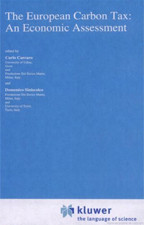The European carbon tax: an economic assessment

01.11.1993
Carlo Carraro, Domenico Siniscalco
Kluwer Academic, Series on Economics, Energy, Environment
The possible introduction of a carbon tax in Europe is an issue which
has attracted the attention of numerous economists and policymakers.
The problems under debate concern the effects of the tax at different
levels: what cost, in terms of GDP growth, will be paid by each European
country? Will the effects on income distribution be larger than those
on income level? Should the carbon tax be co-ordinated among the
European countries or would it be better to impose a uniform tax rate on
carbon emissions? Can Europe introduce the tax unilaterally or should
this be done jointly with the other industrialised countries? This book
provides answers to such questions. It analyses the effects of the
European carbon tax on both a domestic and at an international level.
Contributors: T. Barker, O. Beaumais, M. Botteon, C.
Carraro, R. Clarke, P. Fano, D. Hodgson, M. Hoel, A. Ingham, A. Lanza,
G. Nicoletti, J. Oliveira-Martins, G. Sammarco, S. Smith, A. Ulph, D.
Ulph, H. Welsch, P. Zagamé
The possible introduction of a carbon tax in Europe is an issue which has attracted the attention of numerous economists and policymakers. The problems under debate concern the effects of the tax at different levels: what cost, in terms of GDP growth, will be paid by each European country? Will the effects on income distribution be larger than those on income level? Should the carbon tax be co-ordinated among the European countries or would it be better to impose a uniform tax rate on carbon emissions? Can Europe introduce the tax unilaterally or should this be done jointly with the other industrialised countries? This book provides answers to such questions. It analyses the effects of the European carbon tax on both a domestic and at an international level.
Contributors: T. Barker, O. Beaumais, M. Botteon, C. Carraro, R. Clarke, P. Fano, D. Hodgson, M. Hoel, A. Ingham, A. Lanza, G. Nicoletti, J. Oliveira-Martins, G. Sammarco, S. Smith, A. Ulph, D. Ulph, H. Welsch, P. Zagamé
